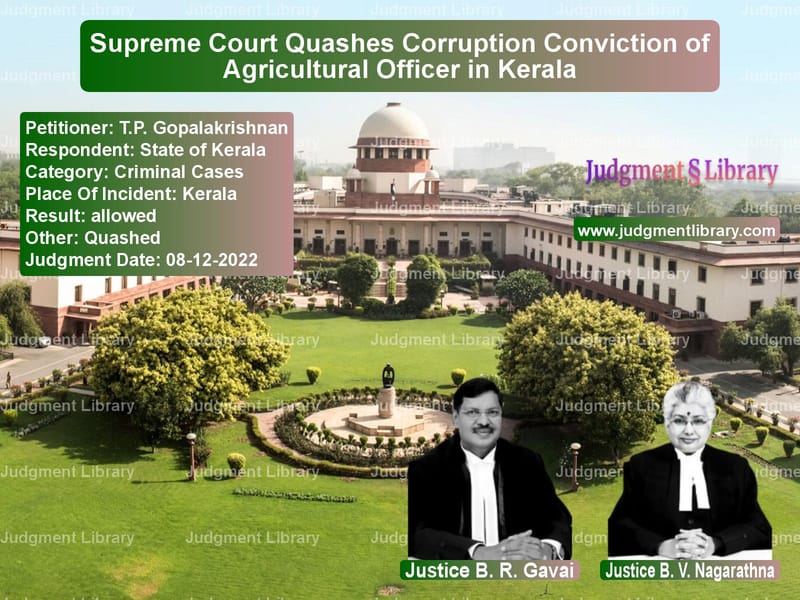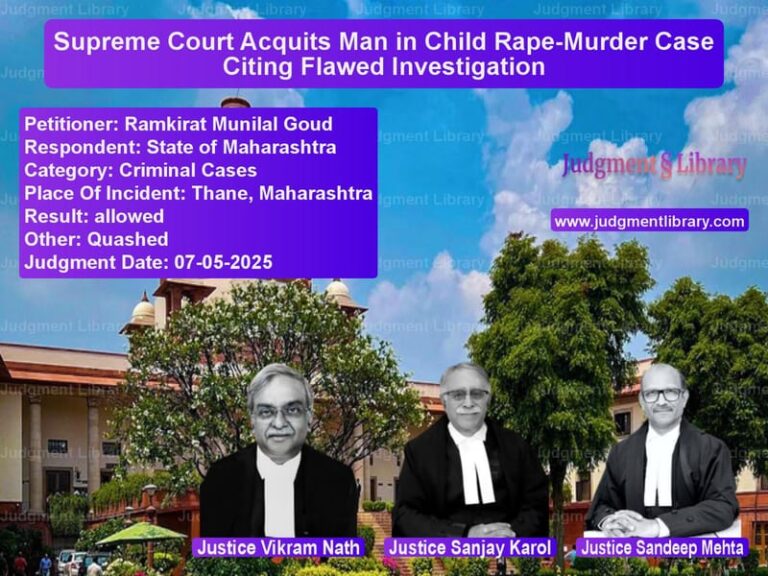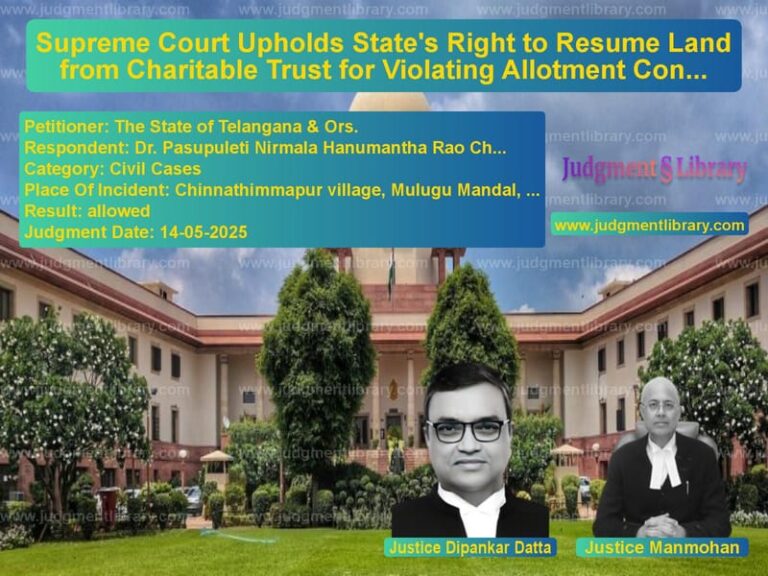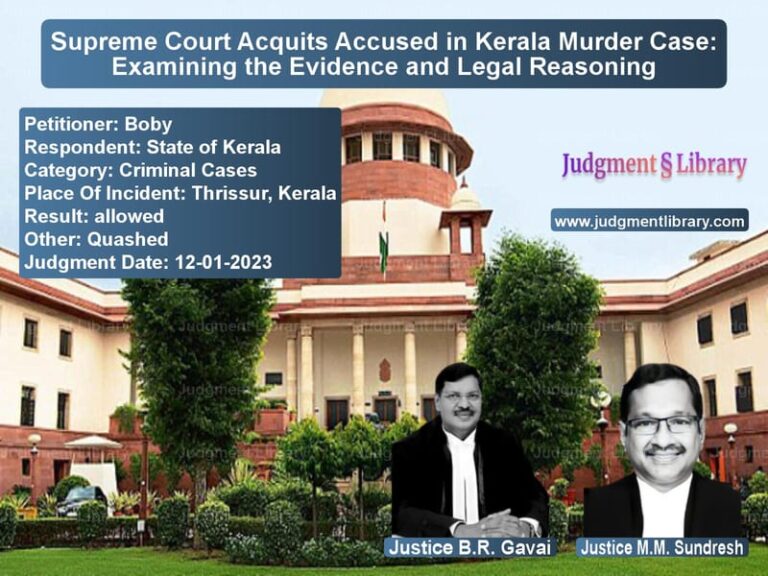Supreme Court Quashes Corruption Conviction of Agricultural Officer in Kerala
The case of T.P. Gopalakrishnan vs. State of Kerala involved a criminal appeal challenging the conviction of the appellant under the Prevention of Corruption Act, 1988, and the Indian Penal Code (IPC). The appellant, a former Agricultural Officer at the State Seed Farm, Perambra, was accused of misappropriating public funds during his tenure between 1991 and 1994. He was convicted by the Trial Court and later by the High Court of Kerala. However, the Supreme Court overturned the conviction, holding that the prosecution violated the principle of double jeopardy and failed to prove the charges beyond a reasonable doubt.
Background of the Case
The case originated from allegations that the appellant, while serving as an Agricultural Officer, misappropriated funds obtained from the auction of farm produce such as coconuts and grains. The prosecution alleged that:
- Between April 1992 and August 1992, the appellant misappropriated Rs. 20,035/- by failing to deposit the amount in the Treasury.
- Between March 1993 and April 1994, he allegedly misappropriated Rs. 58,671/- by not accounting for the sale proceeds from the farm auctions.
The appellant was charged under Section 13(1)(c) read with Section 13(2) of the Prevention of Corruption Act and Section 409 of the IPC. He was convicted and sentenced to two years of rigorous imprisonment by the Trial Court, which was later reduced to one year by the High Court.
Arguments by the Appellant
The appellant, represented by Advocate Adolf Mathew, argued that his conviction was unlawful due to the following reasons:
- The charges against him were based on the same set of facts as three earlier cases (C.C. No. 12, 13, and 14 of 1999), where he had already been tried and convicted/acquitted.
- The prosecution of the present case violated Article 20(2) of the Indian Constitution (protection against double jeopardy) and Section 300 of the Code of Criminal Procedure (CrPC), which prevents a person from being tried twice for the same offence.
- The prosecution failed to obtain the consent of the State Government for a second trial as required under Section 300(2) of the CrPC.
- The evidence presented by the prosecution, including witness testimonies, was inconsistent and insufficient to establish his guilt beyond a reasonable doubt.
- As a public servant, he was dependent on his subordinates for maintaining records, and the missing funds could not be directly attributed to him.
Arguments by the Respondent (State of Kerala)
The State of Kerala, represented by Advocate C.K. Sasi, countered that:
- The appellant, as an Agricultural Officer, was responsible for handling public funds and had misappropriated money by failing to deposit auction proceeds into the Treasury.
- The missing funds were identified during a re-audit, and the appellant was solely accountable for the financial discrepancies.
- Despite holding additional responsibilities, he was still obligated to maintain proper records and ensure the remittance of funds.
- The previous cases did not cover the specific transactions in the present case, and therefore, the principle of double jeopardy did not apply.
Supreme Court’s Observations
The Supreme Court, after analyzing the arguments and evidence, held that the conviction was legally unsustainable. The key observations included:
- The prosecution violated Article 20(2) of the Constitution and Section 300 of the CrPC by trying the appellant for the same alleged misconduct for which he had already faced trial in 1999.
- The Supreme Court cited Vijayalakshmi vs. Vasudevan (1994) 4 SCC 656, emphasizing that a person cannot be tried again for an offence arising from the same facts.
- There was no evidence proving that the appellant personally misappropriated funds.
- The inconsistencies in the prosecution’s witnesses, including the testimony of PW-5, PW-11, and PW-12, weakened the case.
- The prosecution failed to obtain the State Government’s approval for a second trial, making the entire proceeding unlawful.
Supreme Court’s Verdict
Based on the above findings, the Supreme Court quashed the conviction and stated:
“The present cases pertain to the same set of facts and are in respect of the same offences for the same period, committed in the same capacity as the previous three cases wherein the appellant was already prosecuted in 1999.”
The Supreme Court allowed the appeal, set aside the conviction, and declared the prosecution null and void due to procedural violations.
Petitioner Name: T.P. Gopalakrishnan.Respondent Name: State of Kerala.Judgment By: Justice B. R. Gavai, Justice B. V. Nagarathna.Place Of Incident: Kerala.Judgment Date: 08-12-2022.
Don’t miss out on the full details! Download the complete judgment in PDF format below and gain valuable insights instantly!
Download Judgment: t.p.-gopalakrishnan-vs-state-of-kerala-supreme-court-of-india-judgment-dated-08-12-2022.pdf
Directly Download Judgment: Directly download this Judgment
See all petitions in Fraud and Forgery
See all petitions in Bail and Anticipatory Bail
See all petitions in Money Laundering Cases
See all petitions in Judgment by B R Gavai
See all petitions in Judgment by B.V. Nagarathna
See all petitions in allowed
See all petitions in Quashed
See all petitions in supreme court of India judgments December 2022
See all petitions in 2022 judgments
See all posts in Criminal Cases Category
See all allowed petitions in Criminal Cases Category
See all Dismissed petitions in Criminal Cases Category
See all partially allowed petitions in Criminal Cases Category







